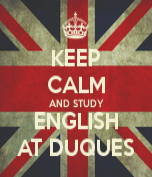,
0
comentarios




ineluctable | |
| Definition: | Not to be avoided or escaped; inevitable. |
| Synonyms: | inescapable, unavoidable |
| Estructura: Sujeto + can + verbo siempre en infinitivo. |
| Estructura negación: Sujeto + cannot (can't)+ verbo principal en infinitivo siempre. |
| Estructura preguntas: Can + sujeto + verbo siempre en infinitivo+? |
| Positivo | Sujeto+ can + verbo principal en infinitivo. | |
| Negativo | Sujeto + cannot (can't) + verbo principal en infinitivo siempre. | |
| Pregunta | Can + sujeto + verbo principal en infinitivo siempre+? |
| Observaciones: - La inglés americano la "a" de "Can" se pronuncia entre un "ea". En inglés británico, en cambio, es una "a" más abierta. -En el inglés hablado es habitual que para negar se utilice "can't" (no cannot). También se distingue claramente el sonido de la "a" americano y el británico. -Es frecuente que al hablar los hispano hablantes no pronuncien bien la forma contraida del negativo "can´t" y no se entienda si dicen"can" o can't"; por ello, aconsejo que en caso de duda, digas:"cannot" |
 |
| image |
 |
| image |
The British Isles rise from a continental shelf, an under water ledge of land extending into the Alantic Ocean from northwestern Europe.
What is the British Isles?
The British Isles is a geographical term which includes two large islands, Great Britain and Ireland, and 5,000 small islands, most notably the Isle of Man which has its own parliament and laws.
NB. The association of the term British with the United Kingdom of Great Britain and Northern Ireland, as well as its association with the island of Great Britain cause the term to be regarded as objectionable or inappropriate to many people in Ireland when it is used to include Ireland.
What is the largest British Isles island?The largest island in the British Isles is Great Britain (England, Wales and Scotland).
1. United Kingdom - a union of:
2.Republic of Ireland
The Irish Sea separates Britain and Ireland.
The islands in the British Isles
The British Isles consists of the following islands:
|

Primer viernes de clase después de Navidad,..¡¡ oh, oh, uhmmm!! creo que hoy es jueves :
A cute fairy tale by Kealan O'Rourke: "Before Sunrise". A nice way to start 2015. Best wishes to all.
Un entrañable cuento de hadas de Kealan O'rourke: "Antes del amanecer". Una forma agradable de empezar 2015. Mis mejores deseos para todos.
Have a nice weekend.
Feliz fin de semana.
¡¡Ah.... !!! Recordad que tenemos pendientes los exámenes la semana que viene, jueves 15 y viernes 16.




















Designed by EZwpthemes
Converted into Blogger Templates by Theme Craft
